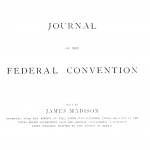Summary
The delegates decided today in Convention that Senators should serve six-year terms with compensation for their public service. Madison spent some time outlining two views of the Senate.
Influences on the Delegates
Madison spoke at length about the role of the Senate in a republican government.
In all civilized countries the people fall into different classes, having a real or supposed difference of interests. There will be creditors and debtors; farmers, merchants, and manufacturers. There will be, particularly, the distinction of rich and poor. It was true, as had been observed (by Mr. PINCKNEY), we had not among us those hereditary distinctions of rank which were a great source of the contests in the ancient governments, as well as the modern States of Europe; nor those extremes of wealth or poverty, which characterize the latter. We cannot, however, be regarded, even at this time, as one homogeneous mass, in which every thing that affects a part will affect in the same manner the whole. In framing a system which we wish to last for ages, we should not lose sight of the changes which ages will produce. An increase of population will of necessity increase the proportion of those who will labor under all the hardships of life, and secretly sigh for a more equal distribution of its blessings. These may in time outnumber those who are placed above the feelings of indigence. According to the equal laws of suffrage, the power will slide into the hands of the former. No agrarian attempts have yet been made in this country; but symptoms of a levelling spirit, as we have understood, have sufficiently appeared in a certain quarter, to give notice of the future danger. How is this danger to be guarded against, on the republican principles? How is the danger, in all cases of interested coalitions to oppress the minority, to be guarded against? Among other means, by the establishment of a body, in the government, sufficiently respectable for its wisdom and virtue to aid, on such emergencies, the preponderance of justice, by throwing its weight into that scale. Such being the objects of the second branch in the proposed Government, he thought a considerable duration ought to be given to it.
In support of a longer term for Senators, Madison again appealed to the “ancient governments, as well as the modern states of Europe” as models for the new republic. Madison’s wisdom here is impressive. He calls the delegates to think about an America with diversity and advanced population growth. Madison viewed the Senate as a voice of moderation and virtue, dedicated to justice for all, even minorities.
Although not a fan of republican government, Hamilton agreed with Madison and added his own perspective using Rome and Britain as examples.
It was certainly true, that nothing like an equality of property existed; that an inequality would exist as long as liberty existed, and that it would unavoidably result from that very liberty itself. This inequality of property constituted the great and fundamental distinction in society. When the Tribunitial power had levelled the boundary between the patricians and plebeians, what followed? The distinction between rich and poor was substituted. He meant not, however, to enlarge on the subject. He rose principally to remark, that Mr. SHERMAN seemed not to recollect that one branch of the proposed Government was so formed as to render it particularly the guardians of the poorer orders of citizens; nor to have adverted to the true causes of the stability which had been exemplified in Connecticut. Under the British system, as well as the Federal, many of the great powers appertaining to government, particularly all those relating to foreign nations, were not in the hands of the government there.
Gerry advised again that America is not like Britain and the longer termed deliberative body envisioned by Madison and Hamilton may run afoul of the wishes of the people.
Our situation was different from that of Great Britain; and the great body of lands yet to be parcelled out and settled would very much prolong the difference. Notwithstanding the symptoms of injustice which had marked many of our public councils, they had not proceeded so far as not to leave hopes that there would be a sufficient sense of justice and virtue for the purpose of government. He admitted the evils arising from a frequency of elections, and would agree to give the Senate a duration of four or five years. A longer term would defeat itself. It never would be adopted by the people.
James Wilson hoped the Senate would have a permanence which could inspire confidence among foreign powers.
The Senate will probably be the depository of the powers concerning the latter objects. It ought therefore to be made respectable in the eyes of foreign nations. The true reason why Great Britain has not yet listened to a commercial treaty with us has been, because she had no confidence in the stability or efficacy of our Government. Nine years, with a rotation, will provide these desirable qualities; and give our Government an advantage in this respect over monarchy itself.
1787 Constitutional Convention Series
To read my series examining the proceedings of the Constitution Convention, click here. In this series, I am writing about any obvious influences on the development of the Constitution which were mentioned by the delegates to the Convention. Specifically, I am testing David Barton’s claim that “every clause” of the Constitution is based on biblical principles. Thus far, I have found nothing supporting the claim. However, stay tuned, the series will run until mid-September.
Constitutional Convention Series (click the link)
To follow on social media, click the following links:
Facebook (blog posts and news)
Facebook (Getting Jefferson Right – history news)
Twitter

